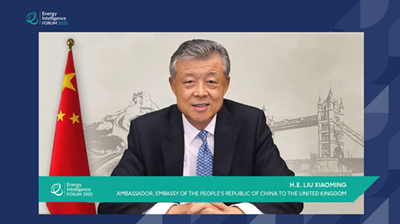Keynote Speech and Q&A by HE Ambassador Liu Xiaoming at the Energy Intelligence Forum


On 13 October, Ambassador Liu Xiaoming attended the Engery Intelligence Forum where he delivered a keynote speech entitled "Address Climate Change and Advance Energy Transition to Make Our Planet a Better Home for All" and answered questions raised by the host of the event.
The following is the full transcript of the speech and Q&A.
Chairman Lara Sidawi Moore,
President Alex Schindelar,
Ladies and Gentlemen:
It is a real delight to join you at the Energy Intelligence Forum.
Themed on "The Big Energy Reset: Covid, Climate, Consequences", today's Forum could not be more timely. Let me take this opportunity to share with you my views on the theme of the forum. I will focus on three questions:
·How do we assess the current situation in energy and climate change?
·What will China do?
·How can we strengthen cooperation to address climate change and promote energy transition?
Covid-19 has been the most challenging pandemic in the past century. It has dealt a severe blow to many trades and industries. Against this backdrop, what is the situation like in climate change and energy transition? In my opinion, there are three major trends:
First, the connection between climate change and energy transition is increasingly close.
Addressing climate change and promoting energy transition matter a great deal to Planet Earth which mankind relies on for survival. In other words, how these issues are addressed holds the key to the future of mankind.
Today, we are faced with many climate change challenges, from frequent extreme weather events to the rising sea level, from the deterioration of the eco-environment and the inadequate response from developing countries to the withdrawal of an individual country from the Paris Agreement. All these challenges can be traced back to the energy industry.
Second, Covid-19 is accelerating energy transition.
Covid-19 has pressed the "pause" button on world economy and energy demand, prompting countries of the world to reflect on the direction and routes of energy transition.
The most urgent task of the day is enhancing global cooperation on fighting Covid-19, restoring economic and social order and injecting fresh vitality. Pursuing green economic recovery has become the consensus of the international community in the post-pandemic world. The structure of the energy industry will become more diversified and this will put further pressure on energy companies to seek development through transition.
Third, Covid-19 highlights the need for harmonious coexistence of man and nature.
The pandemic sounded the alarm. Mankind must stop ignoring the repeated warnings from nature, stop taking without giving back, stop development at the expense of conservation, and stop utilization without rehabilitation.
Man and nature share a common future. We must explore opportunities for development in conservation. Only by following the trend of green and low-carbon development can we find the driving force to "restart" the energy industry.
Last month, at a high-level UN meeting in commemoration of the 75th anniversary of the founding of the UN, President Xi Jinping announced that China will
·scale up its nationally determined contribution,
·adopt even more forceful policies and measures,
·and strive to peak carbon dioxide emissions before 2030 and achieve carbon neutrality before 2060.
This is an attestation of China's audacity to take up the responsibilities in line with the requirements of sustainable domestic development and the goal of building a community with a shared future for mankind.
It is a major policy announcement on climate change.
It is also a display of China's strong resolve to take an active part in global governance on climate change, to take the lead in global green development and to promote global energy transition.
First, China will make greater contribution to advancing global governance on climate change.
With a population of 1.4 billion, China is the world's largest developing country. It is faced with outstanding issues of imbalance and inadequacy in its development.
However, as a responsible global player, China always honors its promises on tackling climate change.
China has implemented the Paris Agreement and achieved remarkable outcomes in energy conservation and emissions reduction.
·From 2005 to 2018, China reduced carbon intensity by 45.8%, cutting CO2 emissions by 5.26 billion tons.
·In 2019, China's energy consumption per unit GDP was down by 2.6% from the level of the previous year and by 25.6% from the level of 2012.
Committed to multilateralism, China has been playing an active part in global governance on climate change.
·China has implemented South-South Cooperation Initiative on Climate Change under the framework of the Belt and Road. Starting from 2012, China spent $72 million on South-South cooperation on climate change every year.
·China has also worked on pooling international efforts for cooperation on climate change via platforms such as the BRI International Green Development Coalition.
Second, China will make greater contribution to promoting green development in the world.
China advocates a new development concept, namely innovative, coordinated, green, open and shared development. We are committed to the belief that "clear water and green mountains are mountains of gold and silver". We are seizing the historic opportunities of the new round of scientific and technological revolution and industrial transformation, and playing an active and leading role in the "green economic recovery" in the post-pandemic world.
China's 14th Five Year Plan will map out routes towards building a green, circular and low-carbon economy. This includes:
·a coordinated approach to epidemic response and economic and social development.
·a new path of high-quality development which gives priority to ecological conservation and is led by green technologies.
·an improved system of investment and financing for tackling climate change.
·And promotion of green production and green way of life.
In pursuing post-pandemic economic recovery, China will
· foster and strengthen energy conservation, environmental protection and clean production industries,
· increase industrial and domestic use of electric, digital and smart technologies,
· promote transformation in multiple areas, such as energy and transportation,
· and continue to be a global leader in green and sustainable growth.
Third, China will make greater contribution to promoting global energy transition.
China has been committed to improving the quality and efficiency of energy supply, accelerating innovation in energy technology, and advancing market-based reform in the area of energy.
In the past decade, China has become the world's largest investor in renewable energy. We have
· built the largest network of clean coal power generation,
· made important breakthroughs in deepwater drilling and shale gas exploration and development,
· encouraged thriving application of new types of energy, including nuclear, wind and solar energy,
· and fostered "internet plus" and smart energy and other new business models in energy.
China has also taken an active part in international energy cooperation.
· China is opening its energy sector wider to the world and keeps expanding cooperation with other countries in oil, gas and nuclear energy.
· China is implementing the Global Energy Internet, taking an active part in the development of energy routes along the Belt and Road, and participating in global cooperation on energy technology.
· China has set up 58 bilateral mechanisms and taken part in 33 multilateral mechanisms for cooperation.
In a word, China has played its part and contributed its solution to global development and cooperation in energy transition.
Ladies and Gentlemen:
The history of mankind is a history of difficulties overcome and challenges tackled. Going forward, China will continue to address climate change and promote energy transition. This will not only contribute to sustainable growth in the world. It will also create more opportunities for cooperation with other countries, including the UK.
First, opportunities for global governance on climate change and environment
The next year will be an important one for global governance on climate change.
In his speech at the UN Summit on Biodiversity last month, President Xi Jinping said that at COP15 to be held in Kunming next year, China and the other participating parties would discuss and draw up plans together for protecting global biodiversity, and turn Earth into a beautiful homeland for all creatures to live in harmony.
Next year the UK will host COP26 in Glasgow.
These two conferences will create opportunities for the energy and industrial communities of the world to enhance cooperation and foster greater synergy in areas such as clean energy and green finance. By matching their complementary strengths, the participating parties will be able to deliver concrete outcomes.
Second, opportunities of greater openness and cooperation in the energy sector
China is committed to building an open world economy. Its current "dual circulation" model emphasizes domestic demand and encourages mutual complementarities between domestic and international demand. In this new development model, open cooperation in energy is an integral part.
China remains the world's most important and vigorous market for energy consumption and import. China will continue to open to investment from all over the world. In November, China will host the third International Import Expo, CIIE, where we hope to see energy businesses from all countries, including the UK.
The Hinkley Point C nuclear power station is a flagship project of China-UK cooperation. Upon completion, it will meet 7% of the UK's total demand for electricity and help reduce 9 million tons of CO2 emission every year. It points to further opportunities for China and the UK to deepen cooperation in civil application of nuclear energy.
Third, opportunities in energy transition and innovation
As the new round of scientific and technological revolution and industrial transformation unfolds, China is making vigorous efforts to promote innovation in green technology, energy and financial services.
Scientific innovation drives high-quality development of the energy industry, and new energy technologies will lead to the upgrading of the entire sector.
The development of new technologies and new business models in China, such as smart grid, electric vehicles, large-capacity power storage and smart energy, will create enormous opportunities for energy businesses from all countries.
Fourth, the opportunities of building a green Belt and Road
Belt and Road Initiative, or BRI, has become the world's largest platform for international cooperation. Green is the salient background of the BRI development roadmap.
China and the UK have jointly issued the Green Investment Principles for the Belt and Road.
Via the BRI platform, energy companies could expand bi-party, tri-party and multi-party cooperation in the areas of environmental protection, energy conservation, emissions reduction, infrastructure development, green finance and FinTech.
Through such cooperation, energy transition will be better integrated into the global efforts of ecological conservation, environment protection and sustainable development.

Ladies and Gentlemen:
A Western saying goes, "Every cloud has a silver lining". A similar Chinese saying goes, "Rainbow appears after the storm".
In the "darkest hour" of the raging pandemic, mankind has displayed strength through solidarity, courage, determination and love.
China stands ready to work with the international community to shore up confidence and tide over the hard times. Together we can address climate change and advance energy transition to make our planet a better home for all.
In conclusion, I wish the Energy Intelligence Forum great success!
Thank you!
Now I would like to take your questions.
Host: What does 2060 carbon neutrality mean for energy demand in China? Where does this leave fossil fuels-oil, gas, and coal-and renewables?
Ambassador Liu: China will scale up its nationally determined contributions, adopt even more forceful policies and measures, strive to peak CO2 emissions before 2030, and achieve carbon neutrality before 2060. Achieving carbon neutrality by 2060 is a very forceful and positive target. It has been widely recognized by the international community. The energy and economic transition and the reduction of CO2 and greenhouse gas emissions in China are happening much faster and with greater intensity than in the developed countries.
On fossil fuels, China's coal consumption accounted for 57.7% of its total energy consumption in 2019, which dropped to a record low. Natural gas has taken a larger share of 7.8% in the energy mix. However, China is still at a stage of rapid economic development, and many industries and regions continue to rely on fossil fuels. The 2060 carbon neutrality target is sending a very clear signal, undoubtedly pushing for transition and upgrading in sectors like energy, transportation, manufacturing, construction and agriculture. China will further develop and improve the carbon emission trading market to allow market-based incentives to do the job of promoting CO2 emission reduction and corporate technological innovation and channeling investment toward low-carbon, green industries.
On renewables, the proportion of non-fossil energy in China's total energy consumption increased to 15.3% in 2019. New industries accompanying the development of new energy are booming. By the end of 2019, the number of new energy vehicles (NEVs) in China reached 3.81 million, accounting for roughly one-half of the global total. Focusing on the 2060 carbon neutrality target, China will continue to expand clean and low-carbon contents in its energy structure, increase the proportion of renewables in total energy consumption, and vigorously promote the application of new energy sources including wind, solar, and nuclear energy.
Host: How do you view China's remarkable economic recovery after the coronavirus outbreak and its strong energy demand growth?
Ambassador Liu: While coordinating epidemic prevention and control efforts, China has been taking measures to restart the economy in an orderly manner and to continue deepening reform and opening up. The Chinese economy has shown remarkable resilience and huge potentials. The momentum for recovery is strong. GDP increased by 3.2% in the second quarter of 2020, ending the economic contraction. China became the world's first major economy to resume growth.
China's energy industry has made important contribution to the victory over COVID-19 by ensuring supply throughout. In the first half of the year, China's total energy consumption fell by 0.2% compared with the same period last year, which came down significantly from the 2.9% decline in the first quarter. Demand for coal, oil and natural gas rebounded. The construction of energy infrastructure including electricity facilities and oil and gas pipelines resumed. The proportion of electricity generated by clean energy has increased, accounting for 27.6% of the total in the first half of the year and rising by 0.1% over the same period last year.
China supports the concept of green recovery. Tackling the challenges and risks of climate change is a long-term, continuous endeavour that can only be made in the process of green recovery. In his recent speech at the United Nations Summit on Biodiversity, President Xi Jinping said this:
"Globally, the coronavirus has wreaked havoc on every aspect of economic and social development. We need to have our eyes on the long run, have determination and stay the course for green, inclusive and sustainable development."
"Recognizing that 'our solutions are in Nature', we could strive to find development opportunities while preserving Nature, and achieve win-win in both ecological conservation and high-quality economic development."
Pandemic control has become the "new normal". China will take into account both short-term tasks and long-term goals, and coordinate economic and social development with addressing climate change. Under the guidance of the new development concept, namely "innovative, coordinated, green, open and shared development", China will continue to take vigorous measures to implement the national climate change strategy, enhance energy conservation and efficiency, promote the development of green industries and strengthen the weak links in environmental infrastructure as quickly as possible.
Host: Why has China stepped up its goals on emission reduction?
Ambassador Liu: China attaches great importance to advancing ecological civilization. We take our obligations under environment-related treaties seriously, including those on climate change and biodiversity. China has made great achievements in the fields of energy saving and emission reduction. The goal of carbon neutrality is a major policy announcement on climate and environment. It is based on the inherent requirements of domestic sustainable development in China and the responsibility of building a community with a shared future for mankind. It demonstrates China's three "firm determinations":
The first determination is to tackle climate change and take the path of green and low-carbon development firmly. The goal of carbon neutrality points to a clear path for China's mid-to-long-term climate action. China will take green, low-carbon and sustainable development as the guideline for current economic recovery and future high-quality development. China will never waver in its strategic determination to strengthen response to climate change and advance ecological conservation.
The second determination is to support multilateralism firmly. Currently, the global multilateral climate process still faces challenges from unilateralism. COVID-19 has posed new challenges to countries of the world in their response to climate change. By stepping up its goals on emission reduction, China is injecting positive energy into multilateralism and boosting international confidence in tackling climate change. This is another vivid manifestation of China's commitment to building a community with a shared future for mankind.
The third determination is to support the implementation of the Paris Agreement and promote global climate governance firmly. The submission of updated NDCs in 2020 is an important juncture for the implementation of the Paris Agreement. China's announcement is in line with the global trend of strengthening climate action. It reflects China's firm support for implementing the Paris Agreement, promoting global climate governance and working with all parties to build a clean and beautiful world.
Host: After President Xi's speech on carbon neutrality, can we expect BRI to become greener with the latest commitments? Where does China see growth for its overseas partnerships?
Ambassador Liu: The Belt and Road Initiative is not only a road to economic prosperity but also a road to green development. As President Xi Jinping pointed out in his speech at the United Nations Summit on Biodiversity,
"A sound ecosystem is essential for the prosperity of civilization. We need to take up our lofty responsibility for the entire human civilization, and we need to respect Nature, follow its laws and protect it. We need to find a way for man and Nature to live in harmony, balance and coordinate economic development and ecological protection."
Since 2013, China has always adhered to the green concept in BRI development, focusing on its integration with the UN 2030 Agenda for Sustainable Development, promoting green and low-carbon infrastructure and operation management, emphasizing ecological conservation in investment and trade, and strengthening cooperation in the fields of ecological environment governance, biodiversity protection and climate change. In line with the carbon neutrality and other emission reduction targets, we could promote a greener BRI cooperation in three aspects:
The first is to establish a green mechanism. In 2019, China jointly initiated BRI International Green Development Coalition with more than 140 partners in 42 countries. China will promote the development of conservation industries such as modern recycle agriculture and industries based on bioenergy, energy conservation, environmental protection, information technology and new energy industries with a view to setting up a BRI green project pool. The Chinese government has also established Belt and Road Environmental Technology and Transfer Centre to promote the joint R&D and application of advanced eco-friendly technologies.
The second is to strengthen ecological conservation. Biodiversity bears on human well-being and is an important foundation for human survival and development. In designing and constructing BRI projects, Chinese enterprises fully considered biodiversity and conservation needs as well as economic development. For example, when Chinese companies built Karachi-Lahore Highway in Pakistan, they planted nearly 300,000 trees and more than 5 million square meters of grass land along the road. Along with new road infrastructure, they also contributed to the local environment.
The third is to enhance cooperation in green finance. More than 30 large financial institutions around the world have signed the "Green Investment Principles for the Belt and Road", which include a full understanding of environmental, social and governance (ESG) risks; full disclosure of environmental information; making full use of green financial tools; adopting green supply chain management, etc.
China will adhere to the concept of open, green and sustainable development, and work with BRI partners to build a green "Belt and Road".
We have implemented the Belt and Road South-South Cooperation Initiative on Climate Change. Since 2012, the annual expenditure for South-South climate cooperation has reached 72 million U.S. dollars.
We have actively carried out third-party market cooperation with developed countries including the United Kingdom on building a green Belt and Road.
We will pool more efforts in international cooperation on climate change via platforms such as Belt and Road International Alliance for Green Development.

































